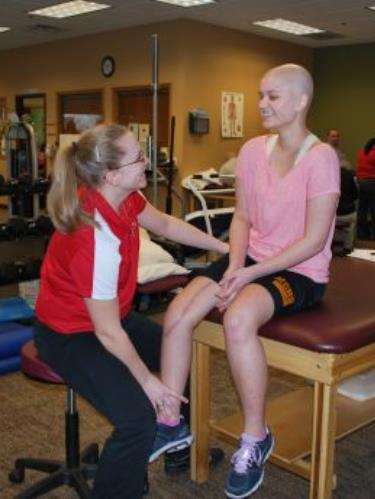Our purpose is to help individuals living with cancer minimize disability, maximize return to function and restore a high quality of life. We bring a personalized approach to your treatment and teach you the skills needed to restore your independence.
Who would benefit?
Therapy at the ATPC is for individuals with a cancer diagnosis who would benefit from rehabilitation to relieve pain, maximize recovery and help restore function resulting from tissue restrictions, movement imbalances or reductions in physical activity.
Our team works together to develop a program to address your specific needs prior to treatment, during chemotherapy and/or radiation, as well as following surgery. Our approach includes education and self-management strategies to maximize your rehabilitation and to empower you in managing your own recovery.
At the ATPC your physiotherapist provides the cornerstone for your care when you are having pain or a restriction of function following your cancer
treatments. Physiotherapy will help you to restore mobility, reduce pain, manage symptoms and restore independence.
A physiotherapy assessment will provide you with a plan to manage the physical side-effects of cancer-related treatments. Appropriate therapy can address restrictions such as a frozen shoulder or weakened muscles to help restore your movement and regain function.
Our physiotherapists work with you before, during and after your treatment to help manage side effects, promote recovery and reduce fatigue.
Pre-treatment
Pre-treatment, also called pre-habilitation, can help your body prepare for the rigours of chemotherapy. The benefits of exercise are extensive and the healthier you are going into the chemotherapy the more likely you will make it through your treatment on schedule and with fewer side effects.
During treatment
Many people are able to exercise during treatment. Once your oncology team endorses your ability to participate we can work with you to develop a plan to maintain your fitness during your treatment. We will determine an appropriate level of exercise to help reduce fatigue and diminish the loss of muscle mass which frequently accompanies chemotherapy.
Recovery
After treatment, fitness plays an important role in restoring your independence and quality of life. It helps reduce two of the most common post-treatment side-effects: fatigue and fear of re-injury. Exercise is integral in helping you to return to work and the physical activities you enjoy.
Exercise also has a role in many cancer prevention strategies. It is a key player in the reduction of body fat which is a factor influencing some types of tumor recurrences. It can help you restore your bone density, regain your balance and improve your sense of muscle coordination.
Who would benefit?
Therapy at the ATPC is for individuals with a cancer diagnosis who would benefit from rehabilitation to relieve pain, maximize recovery and help restore function resulting from tissue restrictions, movement imbalances or reductions in physical activity.
Our team works together to develop a program to address your specific needs prior to treatment, during chemotherapy and/or radiation, as well as following surgery. Our approach includes education and self-management strategies to maximize your rehabilitation and to empower you in managing your own recovery.
At the ATPC your physiotherapist provides the cornerstone for your care when you are having pain or a restriction of function following your cancer
treatments. Physiotherapy will help you to restore mobility, reduce pain, manage symptoms and restore independence.
A physiotherapy assessment will provide you with a plan to manage the physical side-effects of cancer-related treatments. Appropriate therapy can address restrictions such as a frozen shoulder or weakened muscles to help restore your movement and regain function.
Our physiotherapists work with you before, during and after your treatment to help manage side effects, promote recovery and reduce fatigue.
Pre-treatment
Pre-treatment, also called pre-habilitation, can help your body prepare for the rigours of chemotherapy. The benefits of exercise are extensive and the healthier you are going into the chemotherapy the more likely you will make it through your treatment on schedule and with fewer side effects.
During treatment
Many people are able to exercise during treatment. Once your oncology team endorses your ability to participate we can work with you to develop a plan to maintain your fitness during your treatment. We will determine an appropriate level of exercise to help reduce fatigue and diminish the loss of muscle mass which frequently accompanies chemotherapy.
Recovery
After treatment, fitness plays an important role in restoring your independence and quality of life. It helps reduce two of the most common post-treatment side-effects: fatigue and fear of re-injury. Exercise is integral in helping you to return to work and the physical activities you enjoy.
Exercise also has a role in many cancer prevention strategies. It is a key player in the reduction of body fat which is a factor influencing some types of tumor recurrences. It can help you restore your bone density, regain your balance and improve your sense of muscle coordination.

